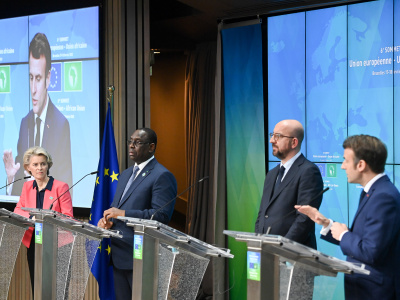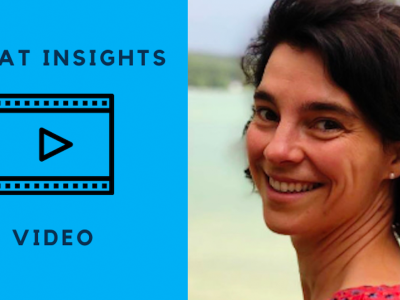
What you shouldn’t have missed in 2015 – A chance to catch up
What's on this page
The year 2015 was a big year for international development and ACP-EU and Africa-EU relations. What were the key highlights of the year? And what did we have to say about them? Let us know your thoughts.
1. The refugee crisis took the centre stage worldwide
The global refugee crisis was unprecedented and caught the world's attention. The Valletta Summit on migration and mobility saw European and African leaders come together to address the urgent issues. ECDPM’s migration expert Anna Knoll contributed to several public and policy debates and stressed that the current ‘crisis response’ mood has led to more short-sighted responses, which carries the risk of approaching mobility as a burden rather than a long-term development opportunity. More on migration and development:- Read an exclusive contribution to our blog from Neven Mimica on migration and development
- Have a look at our dossier on migration and development, including a range of publications, blogs and multimedia
2. A new global sustainable development agenda was adopted
On 25 September, years of preparation finally resulted in a new global sustainable development framework: the 2030 Agenda for Sustainable Development. The world must now put grand words into deeds and deliver on 17 goals and 169 targets by 2030. ECDPM added its voice to the debate, in particular on the role that Europe can and should play. More on the 2030 Agenda:- Read our publication on policy coherence in the new development agenda, our publications on the challenge of measuring peace and security (SDG 16), or our paper and podcast on universality and differentiation in the 2030 Agenda
3. The whole world looked to Paris during COP21
In December, the whole world looked to Paris for two weeks as world leaders negotiated a (partially) legally binding climate change agreement at COP21 - the first of its kind. Will the agreement deliver a reduction in emissions that is so needed and what is the role of Europe, Africa and the ACP in ensuring that climate policy can support sustainable development? ECDPM’s climate change experts Hanne Knaepen and Alisa Herrero Cangas argued that the Paris climate deal is a clear step in the right direction, but that it is also a fragile deal. Governments will need to take radical solutions, immediately. More on climate change:- Read our paper on climate finance in developing countries, our paper on how Africa and Europe could jointly combat climate change and a paper by the European Think Tanks Group on the challenges and opportunities for EU climate action at COP21 and beyond
- Have a look at our publication, video and infographic on climate-smart agriculture in Africa
4. Africa adopted its Agenda 2063
In January 2015, the African Union endorsed its fifty-year strategy for the sustainable development of the continent: the Agenda 2063. ECDPM asked two questions in particular: how will the African countries finance Agenda 2063, and how will they align their transformation agenda with the Sustainable Development Goals, agreed on 25 September?5. Addis Ababa became the world’s ‘finance capital' for a few days
From 13 to 16 July, the UN’s Financing for Development conference took place in Addis Ababa, Ethiopia. Global leaders met with the aim of agreeing on how to finance sustainable development and the eradication of poverty. ECDPM’s James Mackie was present at the conference, participating in several panel debates. He concluded that if the degree of consensus achieved in the conference was anything to go by, the omens looked good for the agreements to be reached during the two other big international fora in 2015: the 2030 Agenda and the COP21. More on financing for development:- Have a look at our dossier on financing for development
- Read the European Report on Development 2015 on financing for development
6. The ACP and EU explored their future relationship
The Cotonou Partnership Agreement between the ACP states and the EU comes to an end in 2020, and discussions about a future relationship are already in full swing. This complex policy process deserves a broad and evidence-based debate. With more than 28 years of knowledge on ACP-EU relations, ECDPM undertook several initiatives to help advance the debate. More on the future of the ACP-EU partnership:- Read the progress report of our political economy analysis, reviewing the current partnership agreement and looking at what could be feasible for a renewed partnership
- Read our independent analysis of the programming of the 11th European Development Fund which is currently being implemented by the EU - and targeted at many of the ACP countries
- Have a look at our dossier with all our past work on the ACP-EU partnership
7. The WTO held it first Ministerial Conference in Africa
The Tenth WTO Ministerial Conference took place from 15-18 December in Nairobi, Kenya. It attempted to deliver on the elusive agreement of the Doha Development Agenda, and deal with controversies over agricultural subsidies and market access for developing countries. However, ahead of the conference ECDPM experts argued that despite previous efforts, scant progress has been made and a breakthrough at Nairobi seemed unlikely. ECDPM’s San Bilal, Francesco Rampa, Isabelle Ramdoo were present in Nairobi and talked about resource-based industrialisation and value chains, regional integration and agricultural subsidies.8. Europe declared 2015 the 'year for development'
The European Year for Development aimed to promote and inform citizens about the EU’s development cooperation and to highlight its initiatives and achievements. A high point on the year’s calendar was the European Development Days on 3 and 4 June. ECDPM was there and participated in several lab sessions and auditorium debates. With around 5,000 participants, the event was regarded a success - but ECDPM’s Rhys Williams asked: ’does the event really present a paradigm shift or is it a Brussels-centric talking shop?’. More on EU development cooperation:- Watch our video interviews from the European Development Days 2015, covering topics such as the role of young people and social media in development, culture, and peace and security
- Read our publication on European aid and development policies in a changing world


